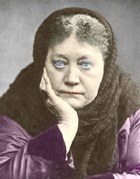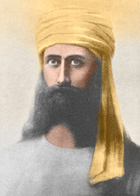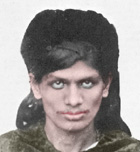Global Theosophy
Global Theosophy
*******
En sand esoterisk stjerneport og stargate.
En indgangsport til andre verdener af energi, visdom og medfølelse
(Theos-L Forum - det ældste teosofiske forum på Internettet.)
(Theos-L Forum - det ældste teosofiske forum på Internettet.)
En privat hjemmeside om
Teosofi, esoterisk visdom og
åndelig
udvikling...
Nogle få af de personer bag moderne Planetarisk Teosofi, som jeg er tilknyttet.
|
Medgrundlægger af moderne Planetarisk Teosofi:
H. P. Blavatsky (1831-91) 
|
Medgrundlægger af moderne Planetarisk Teosofi:
Mahatma Morya (fødsel-?) 
|
Esoterisk Chela af moderne Planetarisk Teosofi:
D. K. Mavalankar (1857-?) 
|
Sufi-schools Esoterical-schools
and Theosophy-schools
and Theosophy-schools
(published Jan. 29th 2002 by Morten Nymann)
The following are merely my views about the science I call Theosophy, the (experiential) science of learning about wisdom, the highest wisdom, Theos-sophia. And the search after it. (For a definition on the word "theosophy", see also ”Theosophy : religion and occult science”, 1885, p. 145-148, especially p. 148.) The ideas aught not to be taken too litterally, but are merely intended as a possible help so to serve as a set of helpful guidelines to various Seekers after Truth.
SUFI, ESOTERICAL and THEOSOPHICAL attitudes TOWARD RELIGIOUS and OTHER CULTS
1. True Sufis, Esoterists and Theosophists (in the following these three are mentioned as "Theosophists") - are opposed to fanaticism and closed minds, believing that these lead to oppression.
2. Many cults using the name "Sufi", "Theosophical" or "Esoterical" have arisen over the centuries.
They have caused harm to their followers, and have, at times, given the word "Sufi", "Theosophical" and "Esoterical" an undesirable flavour.
3. For the above two reasons, initial Theosophists activity has, for centuries, aimed at explaining the nature of real Theosophists aims and also at clarifying the undesirable effect of what today are called conditioning systems.
4. It has been observed by scholars and others that the Theosophists are almost alone in having assessed and described the two undesirable factors referred to above. In so doing, they may have paved the way for contemporary knowledge on mind-manipulation.
While others, for example, were still thinking in terms of "the Devil is behind cults," the Theosophists have pointed out the causes of cults as being purely psychological.
5. Among the characteristics of a "false or misguided path," the Theosophists have noted the following features which help to identify it:
i) The claim that the organisation is the sole repository of truth, or is the only "path";
ii) The mistaking of emotional for spiritual states;
iii) Separation of the followers of the group from the populace at large;
iv) Failure to do one's human duty to everyone, regardless of such people's confessional position;
v) The emphasis upon hope and fear, and upon reward and punishment;
vi) Material richness of the organisation, and especially of its leaders;
vii) The uniqueness of a leader, asserting superhuman or other qualities or responsibility;
viii) Secretiveness as of major importance;
ix) Inability to laugh at things which appear funny to people outside the "path";
x) Employment of stereotyped techniques and/or rituals and exercises, not adapted according to the principles of "time, place and people";
xi) "Idolatry": which includes investing people, animals or things with a special meaning;
xii) "Teachers" who are themselves ignorant.
6. Theosophists do not actually oppose such cults, since Theosophists are tolerant:
but they find it essential to describe them, in order to show the differences between cults and Theosophy, and to help to prevent people interested in Theosophy from forming or joining such organisations or groups.
INDICATIONS OF AN AUTHENTIC THEOSOPHY SCHOOL
First, elimination: the school, its teachers and students should be observed for signs of the features (item 5, above) which identify a spurious school. Second, it should be noted that the following are among the marks of an authentic Theosophy school:
1. It does not restrict attention to any specific literature or teachings, but expects its students to have a good knowledge of a wide range of literature, while at the same time specialising in appropriately measured studies.
2. It will be able to explain and interpret past formulations of the Theosophy Way, as contained in the whole range of Theosophy literature.
3. It will be able to explain the process of supersession of materials.
4. It will not be culture- or language-based. That is to say, it will not need to bring in, except at times for illustration or analogy, words or practices belonging to cultures and/or language other than those of the people among whome the Theosophists are working.
5. It will not use outlandish clothes (robes) or words, etc., extraneous to the local culture.
6. It will not accept slogans or "sayings" from past teachers unless they have an illustrative function.
7. It does not use intonations, movement, music, etc., as a quasi-religious ceremony or as a spectacle, but has knowledge of such things as parts of a comprehensive system of applying stimuli.
8. It will neither claim to have a mission to teach everyone, nor will it enrol everyone. It will first make sure that the interested person has enough information and experience to come to a decision about Theosophists and Theosophy in an appropriate manner.
9. It will make clear the nature of the "instrumental function" of ideas, techniques, etc., rather than regarding them as immutable, sacrosanct, "traditional," and so on.
10. It will deal with everyone according to capacity and character, being neither benevolent nor the reverse: for kindness and cruelty, while effective and understood in ordinary relationships, operate as part of a conditioning system within a teaching or group situation.
SUFI, ESOTERICAL and THEOSOPHICAL attitudes TOWARD RELIGIOUS and OTHER CULTS
1. True Sufis, Esoterists and Theosophists (in the following these three are mentioned as "Theosophists") - are opposed to fanaticism and closed minds, believing that these lead to oppression.
2. Many cults using the name "Sufi", "Theosophical" or "Esoterical" have arisen over the centuries.
They have caused harm to their followers, and have, at times, given the word "Sufi", "Theosophical" and "Esoterical" an undesirable flavour.
3. For the above two reasons, initial Theosophists activity has, for centuries, aimed at explaining the nature of real Theosophists aims and also at clarifying the undesirable effect of what today are called conditioning systems.
4. It has been observed by scholars and others that the Theosophists are almost alone in having assessed and described the two undesirable factors referred to above. In so doing, they may have paved the way for contemporary knowledge on mind-manipulation.
While others, for example, were still thinking in terms of "the Devil is behind cults," the Theosophists have pointed out the causes of cults as being purely psychological.
5. Among the characteristics of a "false or misguided path," the Theosophists have noted the following features which help to identify it:
i) The claim that the organisation is the sole repository of truth, or is the only "path";
ii) The mistaking of emotional for spiritual states;
iii) Separation of the followers of the group from the populace at large;
iv) Failure to do one's human duty to everyone, regardless of such people's confessional position;
v) The emphasis upon hope and fear, and upon reward and punishment;
vi) Material richness of the organisation, and especially of its leaders;
vii) The uniqueness of a leader, asserting superhuman or other qualities or responsibility;
viii) Secretiveness as of major importance;
ix) Inability to laugh at things which appear funny to people outside the "path";
x) Employment of stereotyped techniques and/or rituals and exercises, not adapted according to the principles of "time, place and people";
xi) "Idolatry": which includes investing people, animals or things with a special meaning;
xii) "Teachers" who are themselves ignorant.
6. Theosophists do not actually oppose such cults, since Theosophists are tolerant:
but they find it essential to describe them, in order to show the differences between cults and Theosophy, and to help to prevent people interested in Theosophy from forming or joining such organisations or groups.
INDICATIONS OF AN AUTHENTIC THEOSOPHY SCHOOL
First, elimination: the school, its teachers and students should be observed for signs of the features (item 5, above) which identify a spurious school. Second, it should be noted that the following are among the marks of an authentic Theosophy school:
1. It does not restrict attention to any specific literature or teachings, but expects its students to have a good knowledge of a wide range of literature, while at the same time specialising in appropriately measured studies.
2. It will be able to explain and interpret past formulations of the Theosophy Way, as contained in the whole range of Theosophy literature.
3. It will be able to explain the process of supersession of materials.
4. It will not be culture- or language-based. That is to say, it will not need to bring in, except at times for illustration or analogy, words or practices belonging to cultures and/or language other than those of the people among whome the Theosophists are working.
5. It will not use outlandish clothes (robes) or words, etc., extraneous to the local culture.
6. It will not accept slogans or "sayings" from past teachers unless they have an illustrative function.
7. It does not use intonations, movement, music, etc., as a quasi-religious ceremony or as a spectacle, but has knowledge of such things as parts of a comprehensive system of applying stimuli.
8. It will neither claim to have a mission to teach everyone, nor will it enrol everyone. It will first make sure that the interested person has enough information and experience to come to a decision about Theosophists and Theosophy in an appropriate manner.
9. It will make clear the nature of the "instrumental function" of ideas, techniques, etc., rather than regarding them as immutable, sacrosanct, "traditional," and so on.
10. It will deal with everyone according to capacity and character, being neither benevolent nor the reverse: for kindness and cruelty, while effective and understood in ordinary relationships, operate as part of a conditioning system within a teaching or group situation.